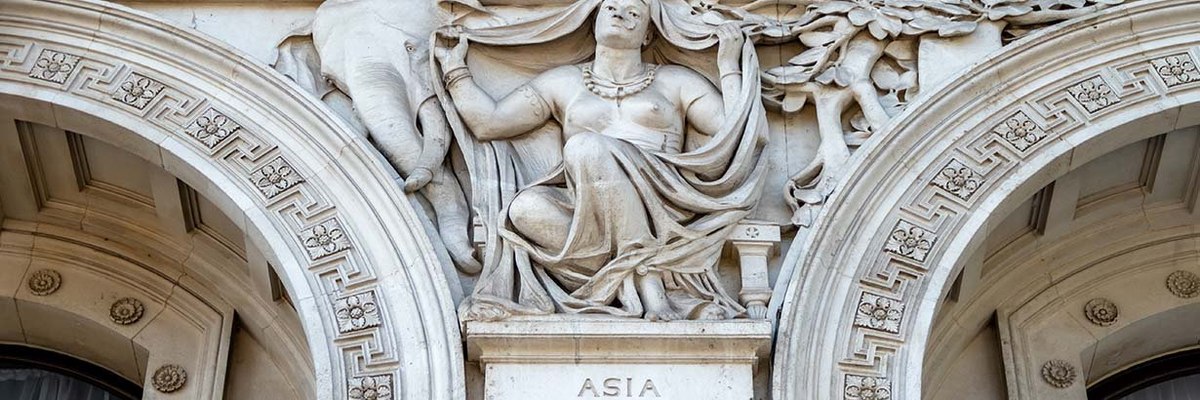Forgive me if you have heard this old joke but it’s worth telling because it was recalled a few days ago by no less a figure than Lord Hannan, the international secretary of the Conservative Party and a member of the Board of Trade. He was drawing attention to a report that has just been produced by some very senior retired mandarins including Lord Sedwill, a former Cabinet secretary. It sets out how our once great nation should conduct itself on the world stage now that we are not so great. So here’s the joke:
A foreign tourist approaches a police officer in Whitehall and asks him: ‘Which side is the Foreign Office on?’ The policeman pauses a moment and replies: ‘That’s a very good question, sir.’
Not exactly a side-splitter I grant you, but Hannan was making the point that there are sharp differences between those diplomats and politicians who believe we should take pride in our colonial history and those who feel we should apologise for it rather than boast about it. It was Sedwill’s report he had in mind when he wrote this week: ‘It concludes that our country should conduct itself as a medium-sized off-shore nation…. Which should be humbler, readier to pool our sovereignty and less hung up on our past.’
Hannan was not impressed with the group’s recommendations for ‘modernising’ the Foreign Office and getting rid of some of the old portraits: ‘Even though we ourselves seem determined to forget it, some of the portraits represent those who gave their lives to extirpating the slave trade between 1808 and 1867 … the most expensive moral foreign policy in human history. If our past teaches us anything it is that, when the chips are down, few other countries are so prepared to step up and do the right thing for humanity as a whole.’
And that, he says, is the heritage that should inspire us today. He quotes Tennyson: ‘though we are not now that strength which in old days moved earth and heaven, that which we are, we are.’
We might not have the influence we had a century ago, he says, ‘but we are still among the world’s five top military powers, a permanent seat-holder in the UN security Council and a nuclear state. We remain a force for good. Our friends on other continents have not forgotten. Neither should we.’ He asserts that few nations have done more, down the years, to promote human rights and the rule of law. The Foreign Office, he says, is one of this country’s greatest assets and its story is ‘embodied in its building’s grand staircases and marbled meeting halls.’
Surely, says Hannan, the Foreign Office must be judged by ‘what has been achieved by those who have inhabited those splendid halls and trodden those grand staircases to create a better life for those whose lives have been spent in poverty-stricken countries.’ And he added this: ‘When we talk of countries becoming ‘more developed’ what we actually mean (though we are too polite to put it this way) is that ‘that they are becoming more like us. In other words, that they are acquiring free parliaments, independent courts, uncensored media and secure property rights.’
He attacks what he calls our ‘self-flagellating wokery which has been picked up overseas, with the striking result that there is far more resentment about British colonialism now than there was at the time, or during its immediate aftermath.’ He claims that in recent years, a cartoonish version of history has been promulgated in this country and exported around the world in which Britain is cast as the villain and, as a result, many people in former colonies fulminate against an imagined version of British colonialism in a way that their grandparents, experiencing the real-life version, never did: ‘Even in India, when the colonial flag was lowered for the last time in 1947, assembled representatives of the new government sang Auld Lang Syne with tears in their eyes.’
As for Britain exploiting its colonies and denying them human rights, Hannan says the opposite is true – ‘universal’ human rights became universal because Britain and allied English-speaking democracies were prepared to defend them with arms: ‘Imagine that World War Two or the Cold War had ended differently. There’d be nothing universal about human rights then.’ And he claims that in foreign capitals, people ‘still cherish the idea of British representatives as wise, experienced and on the side of the ‘goodies’ in that they want a freer, more democratic and more prosperous world.
‘They want to be able to have meaningful conversations about, say, the war in Ukraine or the horrors in Israel and Gaza, secure in the knowledge that our ultimate interest is in a just and peaceful world order…They want, in short, to deal with Britain as a mature democracy, one of the grown-ups in the room. What they don’t want is a purple-haired ambassador with a nose-stud lecturing them about climate change and LGBQWERTY.’
Melanie Phillips in The Times agrees. She summed up the report’s conclusions thus: ‘The Foreign Office should be abolished because it’s a relic of Britain’s imperial past.’ She was not surprised. It was, she wrote, ‘tediously predictable in this era of mandatory self-flagellation over white privilege’.
And what about the view from the other side of the political spectrum?
David Miliband, foreign secretary under Tony Blair and now the president and chief executive of the International Rescue Committee, says Britain’s position and influence in the world has changed since the days of colonialism because the world has changed – not least our own relationship with the European Union. In order to reverse the decline, he writes in The Observer, we need to enter new ‘structures and commitments’ with the EU on foreign policy.
‘Our relations in Nato are strong, but with the EU they are almost non-existent. And this is all the more glaring since the war in Ukraine has brought the EU and Nato closer together… In a world where the EU is shipping weapons to Ukraine, hosting 6 million Ukrainian refugees, is a major development actor, sits in the G20, and is a regulatory superpower in trade, climate and digital areas, we need our mindset to change.’
Miliband believes Britain still has ‘global reach and power’ and retains hard and soft power and is also one of the world’s richer countries and is privileged to have a seat on the UN security council. But, he warns, we have an imperative to understand the realities of our power as it is today, and not as it used to be.
‘We do not have the finance of Saudi Arabia, the EU anchor of France, the regional activism and risk appetite of Turkey or the demographic strength of India or Indonesia. We are one among a number of ‘middle powers’ in the global system. Our wealth, military assets and reputation have all declined relative to others in the last decade.
‘Our position, on critical interests from the economy to the climate crisis, national security and international development, will get worse unless we get our act together. The reason is simple: the world is trending towards an unhealthy disequilibrium, and Britain is on the wrong side of some of the key trends.’
The influential former French diplomat François-Joseph Schichan does not agree that Britain has become a lower-status nation as a result of Brexit. The facts, he writes, ‘contradict this simplistic vision. Since Brexit, there has been no sign that the UK has lost its influence in the world. But he concedes that Britain is ‘not the global superpower it once was and urges closer co-operation with the EU: ‘There is space to intensify bilateral contacts with EU institutions and individual member states on security and foreign policy. The EU should welcome the Labour Party’s proposal for a foreign policy and security pact, and work pragmatically with the UK on the challenges we face together.’
Even so, he says, there are other issues that could have much more impact on Britain’s place in the world than Brexit: ‘The “special relationship” with the US, a mix of reality and fantasy, will continue to be tested regardless of the result of the US election. Either way, it will be America first. Russia and China will be other challenges.’
So where do you stand? Do you agree with the Sedwill report that it’s time to be ‘humbler, readier to pool our sovereignty and less hung up on our past.’ Do you feel a little guilty when you contemplate our colonial history? Perhaps so guilty that we should offer to compensate those countries we colonised? And, if so, how? At the very least should we be a little less boastful?
Or do you believe that we have nothing to apologise for and gave back more than we took?
Let us know.











